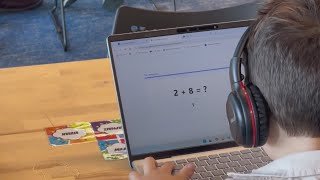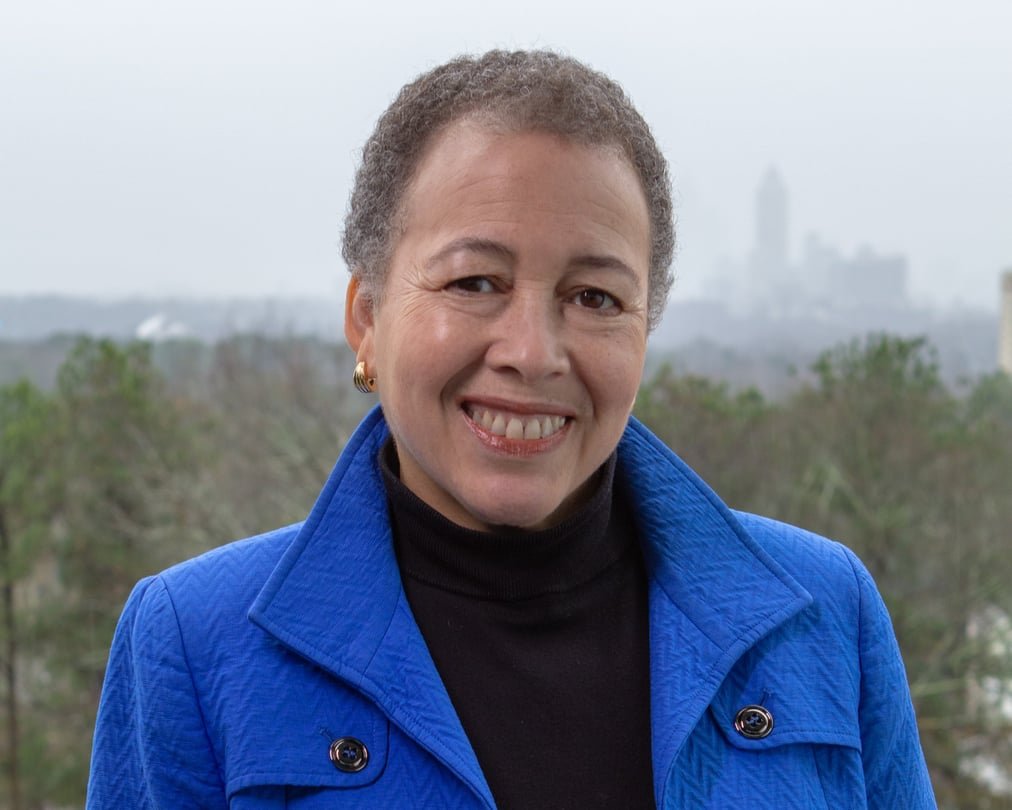U.S. Secretary of Education Linda McMahon toured an Austin private school on Tuesday, which claims it helps students “Learn 2x in 2 Hours.”
Source: Youtube

There are many stories about how artificial intelligence will impact our world — both positively and negatively. Sal Khan, founder and CEO of Khan Academy, believes AI will help education by improving, not replacing, teachers. While this outlook is hopeful, I believe the reality is more complex.
The impact of AI, positive and negative, depends on the type of technology used. Example, it varies based on whether the technology leans politically and whether it’s helpful or harmful to individual students.
The outcome depends on who writes the AI code. Whether you agree with them on politics, history, facts or other matters, we learned during the COVID-19 pandemic that different viewpoints can be amplified or suppressed.
Different AI systems could steer students down various paths, each with a unique perspective. If you evaluate multiple AI systems on the same topic, you’ll often find conflicting answers, depending on the biases of the code’s creator.
While this might sound promising, it means parents will still need to evaluate whether a particular AI tool aligns with their values and worldview. After all, this technology will shape how our children see the world and think in the future.
The quality of education depends largely on the relationship between teachers and students and the source of educational content. Who created the material? Are they aligned with your family’s values and views? In the past, these questions were rarely considered. Today, however, it’s essential to ask them.
That said, I agree with Sal Khan. AI has the potential to help and improve the education system if used properly and aligned with your family values.
Some day we will have AI protection like anti-virus when connecting to the Internet. Until that day, remember, modern education tends to focus on the “middle.” Students at both the top and bottom of the achievement spectrum often aren’t served well. High-achieving students may not be sufficiently challenged, while struggling students can be left behind.
This is part of the reason Khan Academy was founded. Every student learns at their own pace and depth. The platform offers a more tailored approach, which helps address the needs of those who might otherwise be overlooked.
Khan Academy does well because its approach meets students where they are, offering individualized learning paths.
A crucial question remains: will AI truly improve education and benefit your children specifically?
The best educational path involves a variety of choices, allowing you to select the right school, teachers, and AI tools for your child’s needs.
Finding the right fit will help ensure your child gets the most out of their learning experience, though it will take time and effort to find the ideal program.
More from Jeff Kagan: AT&T finally ends DirecTV nightmare

NEA president: This technology will continue to fundamentally change the way we teach and learn
“Understanding AI goes far beyond tools and apps. This technology will continue to fundamentally change the way we teach and learn, and the ways we interact with the world and each other,” said NEA President Becky Pringle. “Our students and educators cannot be passive users; they must have agency with this technology and an appreciation for the uniquely human assets we bring to learning and to our professions.”
“Educators prepare every generation to meet the future — and today, they’re shaping how AI becomes a tool for confidence, creativity and critical thinking,” said Brad Smith, Vice Chair and President of Microsoft. “Our partnership with NEA is rooted in a simple truth: Technology is only as valuable as the people empowered to use it. Through Microsoft Elevate, we’re investing in AI literacy and leadership, so educators and students stay at the center of AI in the classroom.”
Last year, NEA partnered with the International Society for Technology in Education (ISTE) to deliver an AI learning series that reached thousands of members. Building on that success, the new Microsoft grant will enable NEA to engage an additional 10,000 members with fresh content and micro-credentials, further strengthening the knowledge and fluency of both educators and leaders in this emerging field. The grant will also support a dedicated focus on policy and leadership development for NEA’s state affiliates.
“By preparing educators and leaders with the knowledge to lead and innovate educational practices and policies, and by providing avenues of practitioner input into the design of AI tools, we strive to ensure AI technologies are used in human-centered ways that promote equity, mitigate potential harms, and enrich both teaching and learning,” said
Through this grant, NEA reaffirms its commitment to elevating professional excellence, amplifying educator voice, and guaranteeing that every student has access to safe, equitable and high-quality learning opportunities amid rapid technological change.
Last July, nearly 7,000 educator delegates gathered at the
At the heart of the new policy is the principle that the student-educator connection must always be the center of the teaching and learning experience and must play a significant role in every consequential education decision.
“Decades of research tell us that student success relies on our ability to build healthy and effective relationships with students. Their sense of feeling supported and valued predicts their success and their love of learning,” said
Read NEA’s full NEA’s full Policy Statement on AI in education.
Visit NEA AI hub page for guidance, tools and professional learning opportunities to help educators navigate the evolving role of artificial intelligence in schools and classrooms.
Follow us on Bluesky at https://bsky.app/profile/neapresident.bsky.social and https://bsky.app/profile/neatoday.bsky.social.
About The National Education Association
The National Education Association is the nation’s largest labor union, representing nearly 3 million elementary and secondary teachers, higher education faculty, education support professionals, school administrators, retired educators, students preparing to become teachers, healthcare workers, and public employees. Learn more at www.nea.org
About Microsoft
Microsoft (Nasdaq “MSFT” @microsoft) creates platforms and tools powered by AI to deliver innovative solutions that meet the evolving needs of our customers. The technology company is committed to making AI available broadly and doing so responsibly, with a mission to empower every person and every organization on the planet to achieve more.
![]() View original content to download multimedia:https://www.prnewswire.com/news-releases/nea-receives-microsoft-grant-to-expand-ai-literacy-and-leadership-302552808.html
View original content to download multimedia:https://www.prnewswire.com/news-releases/nea-receives-microsoft-grant-to-expand-ai-literacy-and-leadership-302552808.html
SOURCE Microsoft Corp.

U.S. Secretary of Education Linda McMahon toured an Austin private school on Tuesday, which claims it helps students “Learn 2x in 2 Hours.”
Source: Youtube

Former president of Spelman College Dr. Beverly Daniel Tatum has authored a book that focuses on the current challenges leaders face in higher education.
“Peril and Promise: College Leadership in Turbulent Times,” sheds light on the issues plaguing higher education and Tatum’s reflections on how we can resolve them, based on leading Spelman for 13 years.
Tatum left before the instability brought on by the COVID-19 pandemic, but her journey was far from peril-free. As a trailblazing Black woman in a field typically dominated by white men, Tatum also led Spelman during the Great Recession and market crash of 2008, and other stressful incidents for students — like when there was an active shooter on campus.
Now on her recent book tour, she sat down with WABE’s “Morning Edition” to discuss the journey of her career, and to answer questions on what she calls the current “assault on higher education” and what it means for America’s future. Tatum says the pressure has grown so severe that the average tenure of university presidents has fallen to less than six years.
But in her book, Tatum argues that American universities hold the key to addressing a growing ignorance and division that threaten our society — if bold and courageous leaders step up.
Lily Oppenheimer contributed to this report.


The Guardian view on Trump and the Fed: independence is no substitute for accountability | Editorial
Building Trust in Military AI Starts with Opening the Black Box – War on the Rocks


SDAIA Supports Saudi Arabia’s Leadership in Shaping Global AI Ethics, Policy, and Research – وكالة الأنباء السعودية


Journey to 1000 models: Scaling Instagram’s recommendation system


Mumbai-based Perplexity Alternative Has 60k+ Users Without Funding


Macron says UK and France have duty to tackle illegal migration ‘with humanity, solidarity and firmness’ – UK politics live | Politics


VEX Robotics launches AI-powered classroom robotics system


Happy 4th of July! 🎆 Made with Veo 3 in Gemini


Kayak and Expedia race to build AI travel agents that turn social posts into itineraries


OpenAI 🤝 @teamganassi